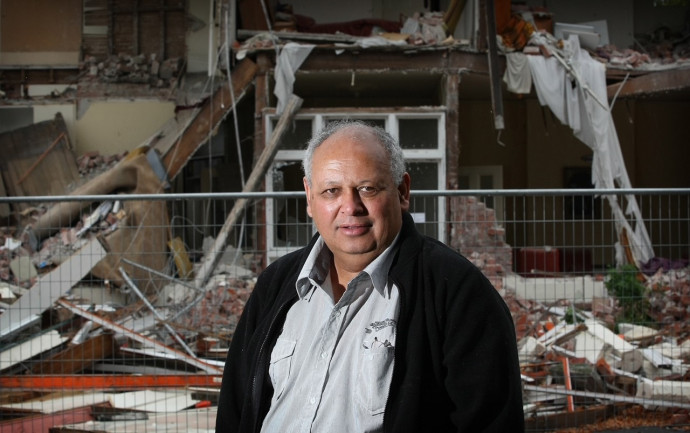2023 Te Rangaunua Hiranga: A career committed to people

Professor Regan Potangaroa (Ngāti Kahungunu ki Wairarapa) has been awarded the Te Rangaunua Hiranga Māori Award after devoting his career as an engineer and architect to humanitarian deployments, emergency response efforts, and marae restorations.
Regan has spanned from using drones to locate bodies which had been buried in unmarked graves in 1920 when Influenza swept through Wairarapa Māori to supporting the response and recovery for communities in Kaikoura after the 2016 Kaikoura earthquake, where his research informed the relocation of paua beds.
Regan has completed more than 200 humanitarian deployments in 22 countries since 1996, and his ethical approach to his work has formed the core of his academic research.
Following the devastating Cyclone Gabrielle earlier this year, Regan worked with Aohanga Incorporation – owners of Owāhanga Station, one of the largest landholdings in Wairarapa – to coordinate local relief efforts and provide support to ensure the safety and wellbeing of those affected by the storm.
“These efforts have made a significant impact on the community, demonstrating his unwavering commitment to supporting those in need,” a nomination supporter says.
Regan also served on the Station’s management committee from 1983 to 1991 and was re-elected in 2022.
During his first stint, he was pivotal in stabilising the structure of Pāpāuma Marae, Tipuna Whare, built in 1905, at a time when the committee would have preferred that it “collapsed and disappeared”.
“Pāpāuma Tipuna Whare is now 117 years-old, and work towards restoration of the Wharenui continues. Regan’s expertise will play a significant role in the restoration of Pāpāuma,” the supporter says.
Recently, Regan worked with the United Nations High Commissioner for Refugees as part of a shelter team in Bangladesh with the Rohingya Emergency Response.
Regan brings his advocacy for sustainable and resilient built-environments, developed from research in the humanitarian field, back to the marae. His community projects include ways to seismically strengthen and retain marae, avoiding large costs by using “whānau-isation”.
With about 70% of Aotearoa’s 1300 marae expected to have buildings classified as ‘earthquake-prone’ over the next 20 years, Regan’s approach of “whānau-isation”— the pooling of resources to take a hands-on, community-driven approach — could allow cost-effective renovations.
He says there are about 40 marae across the nation that will be issued demolition orders under the 2017 Amendment Act for Earthquake-prone Buildings.
“I am working with three of them in the Wellington and Wairarapa region. The key to this work has been providing information to the users and marae committees involved so that they can make reasoned decisions about the way forward.”
Regan says hapū were previously being forced to demolish their marae, which makes the work he is doing even more significant.
Regan’s expertise includes leading large teams in rebuilding after damage caused by disasters like the 2011 earthquake in Otautahi.
He has also produced highly regarded research on Māori wellbeing and provided Te Ao Māori expertise for research on intergenerational wellbeing, resilience, and disaster-risk reduction.
Through Massey University’s School of Built Environment, he is currently working with the International Federation of Red Cross and Red Crescent Societies, developing their capacity training for the incorporation of Housing Land and Property issues into existing shelter and settlement programs for the Asia-Pacific region.
Te Rangaunua Hiranga Māori Award:
This award recognises excellent, innovative co-created research by Māori, that has made a distinctive contribution to community wellbeing and development in Aotearoa New Zealand.
Citation:
To Regan Potangaroa for a lifetime working towards Tino Rangatiratanga for Maori, and the built environment they occupy and live in, including ways to seismically strengthen and retain Marae.
